The VSVR 1884-1890 (Part 1)
As Lenin and his new Politburo began to fully assert their control over the Republic they took control of a divided and battered land. The crushing of the Anarchists and their subsequent suppression left a wide section of society and the Party without a body to unite around, dissatisfied and even militant. Every single member of the Politburo with the exception of Bernstain seemed to agree on one point – the best way to unite the country again would be to wage a grand revolutionary war against the Frankish juggernaut of Western Europe. Victory would unite the Republic, galvanise the international revolution and assert the VSVR’s military might over an entire continent. If France could be beaten then there was not a single nation of earth capable of defeating the Comintern.
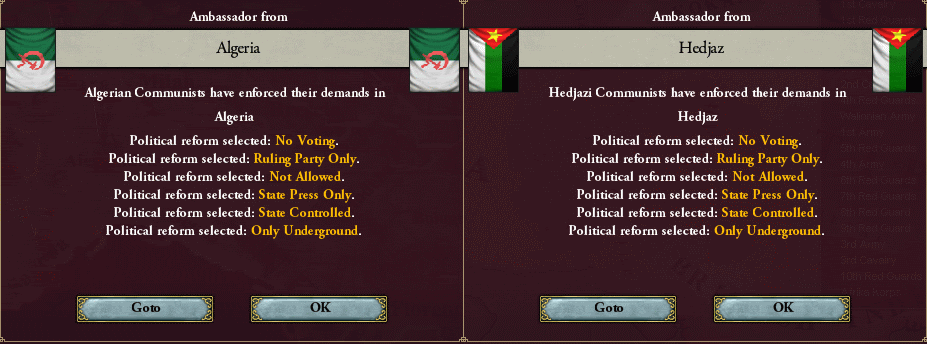
As tensions across the Rhine continued to build up towards violent conflict during 1884 Socialism secured two more triumphs in the Arab world – where despite the power of Islam Communism had become very popular. It is believed that the original Yemeni revolution of 1874 was the root of the success of Socialism in the former Muslim world. Since then Afghanistan, the CSR (once the Ottoman Empire) and now Hedjaz and Algeria had all embraced the Comintern. These two states in particular were strategically invaluable. Firstly Algeria had long been dominated by France so the loss of French influence in this territory greatly undermined French authority across North Africa. More symbolically the Hedjaz contained Islam’s holiest cities in Mecca and Medina. Although the Islamic variation of Socialism was not so hard-line in its anti-religious stance as the European variation it was Atheist at heart. The new Hedjazi government simply started to passively undermine Islam in this holiest of territories. Pilgrims were still allowed to arrive but were encouraged to renounce their faith whilst across the region Mosque goers would be greeted at the entrance to their place of worship by educators informing them of the Socialist message.
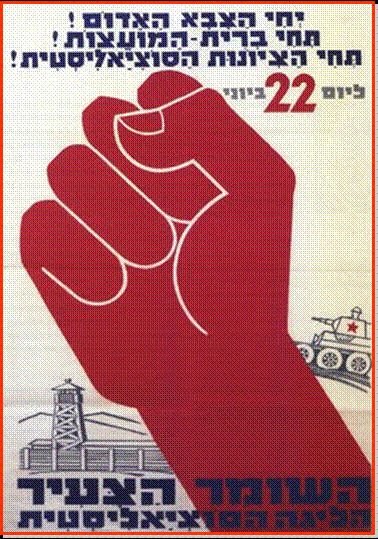
On November 8th 1884 around 360,000 Red Army soldiers started to pour across the Franco-Republican border as the fragile French Monarchy faced almost certain destruction. On top of this force the VSVR called up the reservists who contributed a further 1.6 million men whilst the Republic’s Comintern allies could bring another 150,000 to bare (most of whom were Danes). France was to be supported by here network of European allies in Italy, Switzerland and Luxemburg as well as a large White insurrection in Spain which broke out within a week of the declaration of war (effectively neutralising the threat of offensives on the Southern Front).
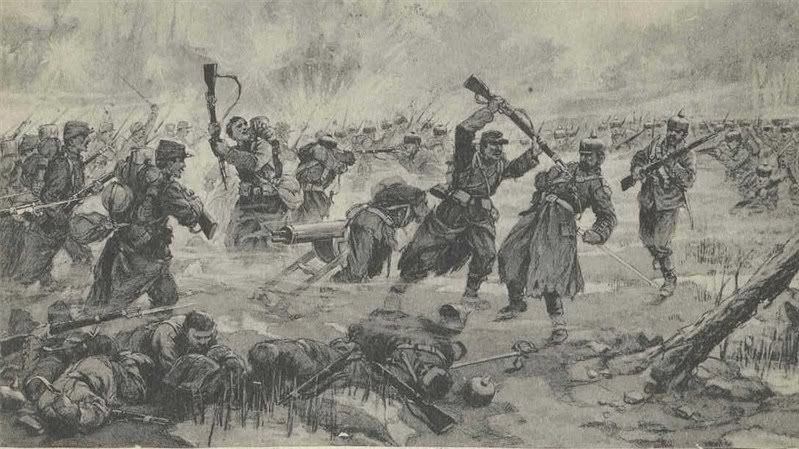
This conflict had been touted as a mighty clash between the two strongest representatives of their respective ideologies – socialism and capitalism. Yet utter French incompetence meant that the conflict was, for all intensive purposes, won within a few weeks. In the border regions of Northern France the sheer speed and power of the Red Army offensive smashed the French standing army scattering it – leaving it to face either capture of a long retreat southward. Even at this stage the French could have brought their fearsome reserve army into the field to push back the Reds as the VSVR’s own reservists prepared to be flung into major combat – yet it took three whole weeks for the French to commence mobilisation by which stage the border forts were lost and Paris was under siege.
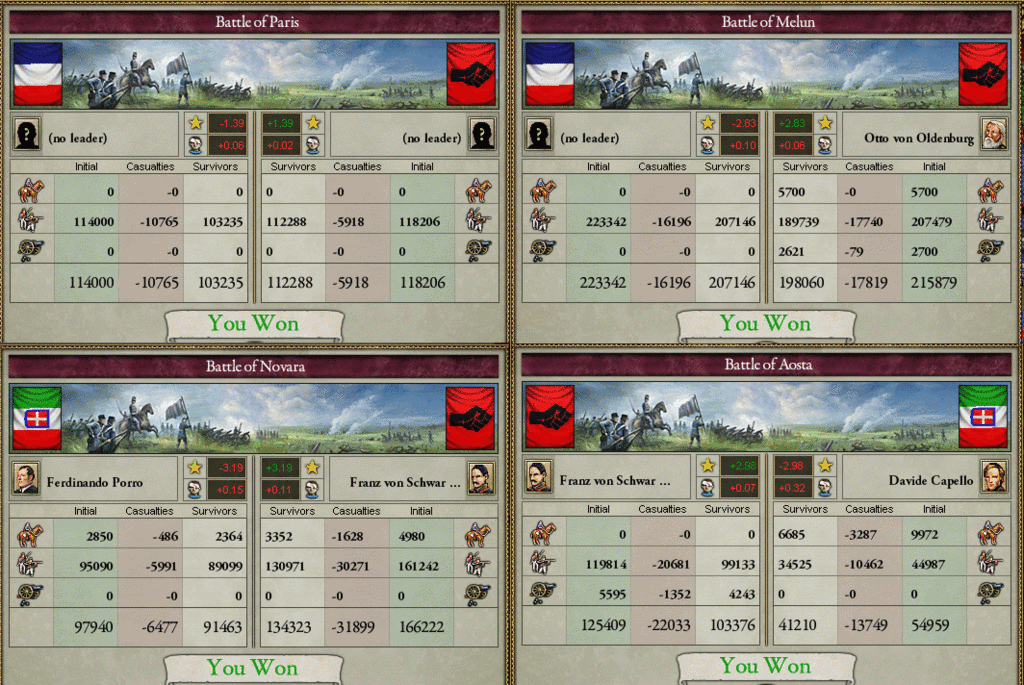
The French did indeed rally during December and January as they unleashed a major offensive towards Paris with an aim of saving the city. However defeats first at the City of Lights itself and then shortly later at Melun ended all hopes of not only saving Paris but of saving France. At the same time the Italian Army fared considerably better despite its lack of equipment, strong fortifications or trained troops and officers as the French had. At Novara the Italians inflicted an impressive 32,000 casualties and suffered just 6,500 whilst at Aosta the Italians gave the huge advancing Red Army a bloody nose as they inflicted twice as many casualties as they received. Yet with the Alpine passes now lost the vital industrial region of Piedmont was not left open for the Red Army to overrun.
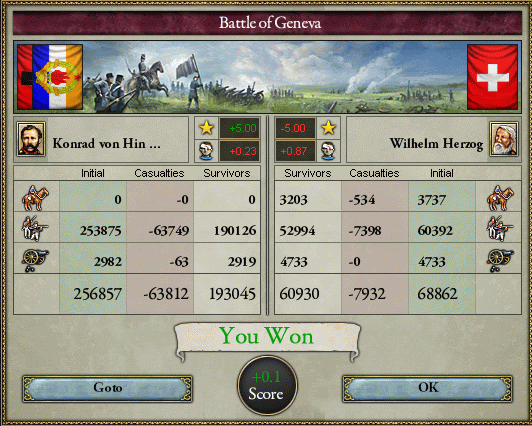
The most spectacular battle of the entire war came in Switzerland as the ridiculously competent Swiss Army faced a huge Comintern force between January and April 1885. In total ¼ of a million Comintern soldiers would fight and over 60,000 would die – this casualty figure is similar to the size of the entire Swiss army.
Yet for all the Alpine heroics of the Swiss the field of battle that mattered in this war was France and in France the Red Army utterly wiped out the French standing and reserves Army and occupied most of the country.
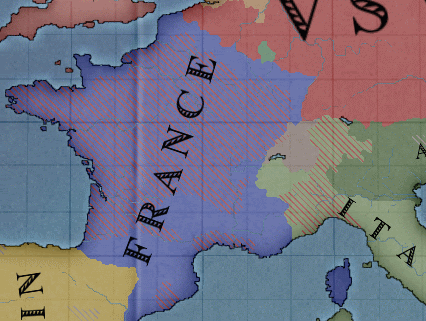
On September 22nd 1885 King Philippe VII, the last, signed the most humiliating piece of paper in French history – the Treaty of Brugge. In Brugge Philippe surrendered Catalonia to Spain and Alsace-Lorraine to the VSVR. He agreed to allow the VSVR to annex Luxemburg and agreed to allow the Red Army to establish a Communist regime in Italy. Shortly later Republican elements in France forced Philippe to abdicate and established the Second Republic.
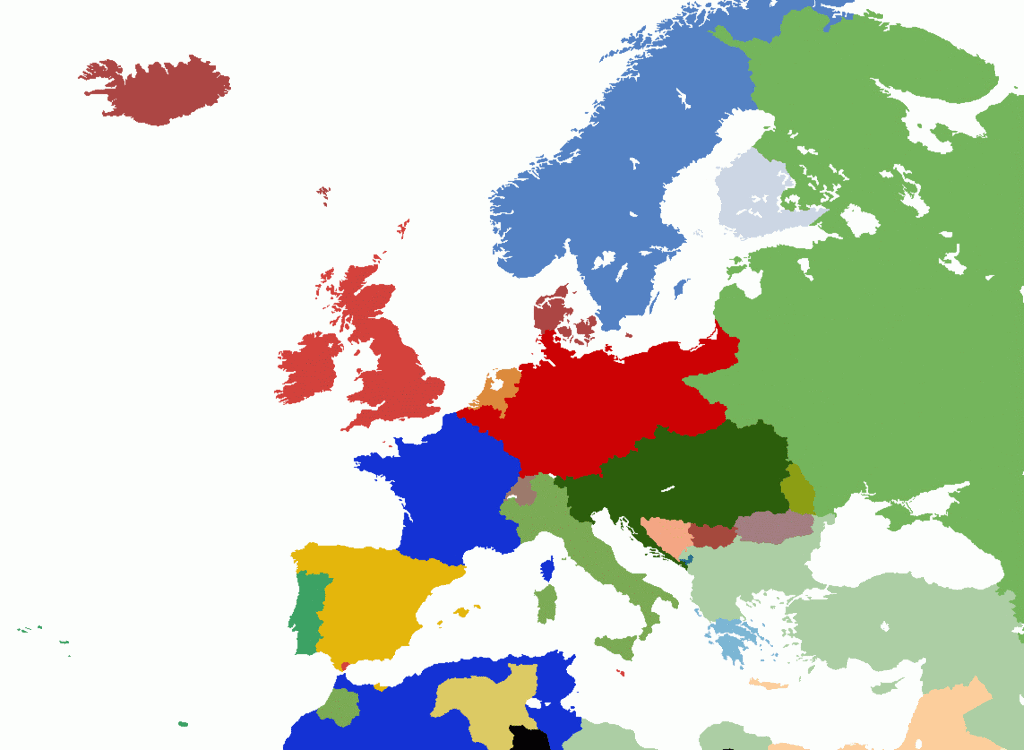
The geopolitical position in Europe had now radically changed. Firstly, and most importantly, there was not a single realistic rival to the VSVR on the Continent with the economic and military muscle to compete with the VSVR – only Britain could present a true challenge and shortly after the conclusion of the Treaty of Brugge VSVR industrial output overtook Britain’s as the VSVR economy became the most powerful on earth. Out of 20 sovereign nations in Europe 8 were now members of the Comintern.
Shortly after his ascension to the Chairmanship following the Civil War Lenin had started to institute fierce anti-religious policies that would revolutionise the Republic’s previously passive attacks on religion. In the Atheist Laws of 1884 and 1885 Lenin made it illegal for an individual to attempt to forcibly convert another to any particular religion – this essentially made it illegal for priests, pastors and rabbis to preach to anyone other than the already converted. Whilst the Church had long been shorn of its property Church buildings continued to function in communities – Lenin introduced a crippling tax on all religious buildings which would encourage them to close down, as well as bolstering the faltering coffers of the Republic. A vicious propaganda campaign was also unleashed to help fuel anti-religious sentiment across the Republic whilst Lenin sent out encouragements to the Comintern for other Parties to make similar actions.
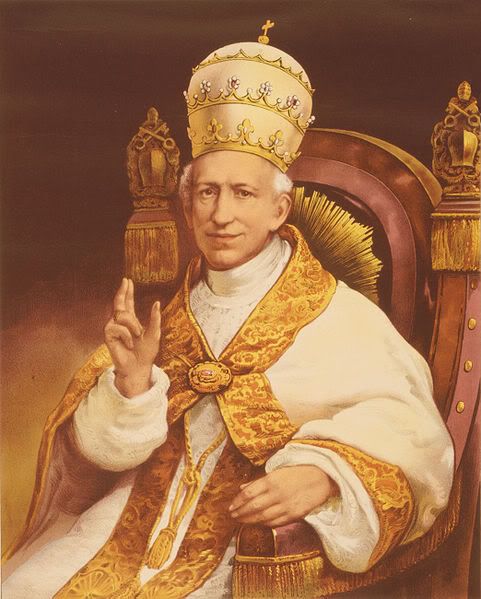
The revolution in Italy presented the Comintern with a very difficult question – what to do about his Holiness?
The People’s Party of Italy was not entirely secure in its position. Propped up by 20,000 Red Army soldiers and a small but growing People’s Army of Italy the regime could not call upon popular support across the country. Indeed the Marxists had been forced to align with the popular Anarchists to form a United Front government, much to Lenin’s chagrin. Outside of industrial Piedmont and the large industrial city of Naples Italy was still overwhelmingly rural, poor, peasant based and Catholic. The diehard Communists could not abide by having the Pope just a few miles from the base of the Party in Rome and many called for the storming of St Peter’s, the execution of the Pope and the toppling of the Catholic Church. Yet the government knew fine well it would not survive such actions. Instead Italian People’s Army units besieged the Vatican and refused to allow supplies through. After some 3 weeks of rather hidden siege Pope Leo XIII was forced to come out and negotiate with the government. In the end Leo made a very welcome compromise with the government. The area around St Peter’s was separated entirely from the Italian state and became the independent state of the Vatican City – this gave the Pope independence and allowed the government to avoid the contradiction of housing their greatest of enemies. Leo was guaranteed freedom to practise religion for Catholics in Italy but was forced to accept the acquisition of Church property. However the government also agreed not to harm any of the magnificent art works and architecture belonging to the Church in the peninsula. A welcome compromise even if it was derided by Catholics and Communists alike, without it Italy would have been in civil war and the entire Catholic world would have borne down on the Comintern in vengeance.
On January 4th 1886 Lenin passed a piece of legislation that shortened the maximum working day from 12 hours to 10 hours. Despite military victory in the French War the people of the Republic had remained very agitant ever since the Civil War and Lenin’s popular reform helped bring an abrupt end to the unrest.
The peace was not to last for long as on May 3rd, just 8 months after concluding the French War the VSVR went to war again – this time against the snivelling Habsburg Empire.
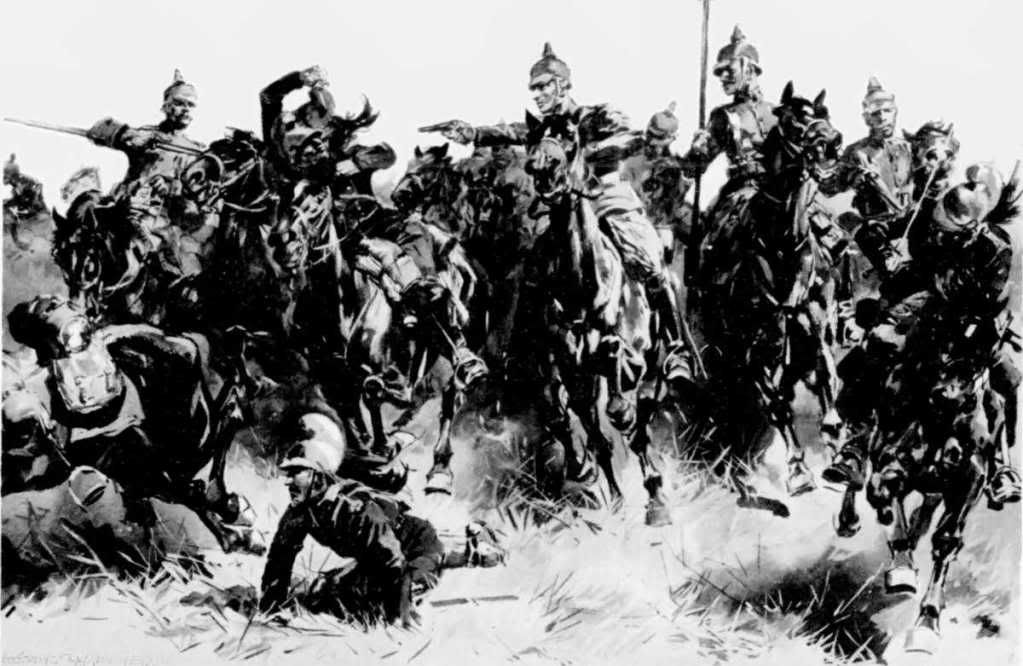
Surprisingly the Austro-Hungarian Army, despite lacking the modern equipment of the Red Army of even the French Army, fared considerably better than the French Army had against the revolutionary juggernaut. Despite the fact the VSVR never mobilised its reserves the Habsburg Generals have to be credited with an impressive, if doomed, defensive campaign that was fought between May 1886 and January 1887.
The Red Army poured into the Tyrol, towards Vienna, into Moravia and Galicia and was met by strong resistance in each sector whilst the Italians made weak efforts to advance into Lombardy; they never even captured Milan despite it being just a few miles across the border. In the long run, despite sterling resistance, the Habsburgs could never muster enough quality troops to hold back the Comintern forces indefinitely. In November their lines finally cracked and by January Vienna, most of the Tyrol, Slovakia, Western Galicia and Moravia were all occupied. The Habsburg Emperor was grateful to accept the light demands of the VSVR and surrendered Lombardy to Italy. Lenin had hoped an additional industrial territory would help cement the position of the workers in Italy.
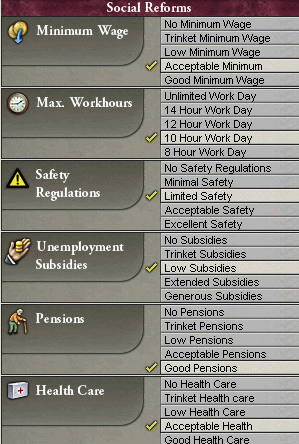
Following the war Lenin enacted another social reform as he raised the minimum wage to an acceptable level.
By the start of 1887 France had slipped to position of the number 5 power in the world behind Britain, the VSVR, Russia and now the USA whilst the Austro-Hungarian Empire slipped to an all time low of number 7 as Mexico overtook it.
With all the military successes Lenin had largely failed to address the much more important issue of the economy during this first part of his 2nd term as Chairman. However following the war with the Habsburgs he would rearrange his entire focus from foreign escapades to economic policy.
As Lenin and his new Politburo began to fully assert their control over the Republic they took control of a divided and battered land. The crushing of the Anarchists and their subsequent suppression left a wide section of society and the Party without a body to unite around, dissatisfied and even militant. Every single member of the Politburo with the exception of Bernstain seemed to agree on one point – the best way to unite the country again would be to wage a grand revolutionary war against the Frankish juggernaut of Western Europe. Victory would unite the Republic, galvanise the international revolution and assert the VSVR’s military might over an entire continent. If France could be beaten then there was not a single nation of earth capable of defeating the Comintern.

As tensions across the Rhine continued to build up towards violent conflict during 1884 Socialism secured two more triumphs in the Arab world – where despite the power of Islam Communism had become very popular. It is believed that the original Yemeni revolution of 1874 was the root of the success of Socialism in the former Muslim world. Since then Afghanistan, the CSR (once the Ottoman Empire) and now Hedjaz and Algeria had all embraced the Comintern. These two states in particular were strategically invaluable. Firstly Algeria had long been dominated by France so the loss of French influence in this territory greatly undermined French authority across North Africa. More symbolically the Hedjaz contained Islam’s holiest cities in Mecca and Medina. Although the Islamic variation of Socialism was not so hard-line in its anti-religious stance as the European variation it was Atheist at heart. The new Hedjazi government simply started to passively undermine Islam in this holiest of territories. Pilgrims were still allowed to arrive but were encouraged to renounce their faith whilst across the region Mosque goers would be greeted at the entrance to their place of worship by educators informing them of the Socialist message.

On November 8th 1884 around 360,000 Red Army soldiers started to pour across the Franco-Republican border as the fragile French Monarchy faced almost certain destruction. On top of this force the VSVR called up the reservists who contributed a further 1.6 million men whilst the Republic’s Comintern allies could bring another 150,000 to bare (most of whom were Danes). France was to be supported by here network of European allies in Italy, Switzerland and Luxemburg as well as a large White insurrection in Spain which broke out within a week of the declaration of war (effectively neutralising the threat of offensives on the Southern Front).

This conflict had been touted as a mighty clash between the two strongest representatives of their respective ideologies – socialism and capitalism. Yet utter French incompetence meant that the conflict was, for all intensive purposes, won within a few weeks. In the border regions of Northern France the sheer speed and power of the Red Army offensive smashed the French standing army scattering it – leaving it to face either capture of a long retreat southward. Even at this stage the French could have brought their fearsome reserve army into the field to push back the Reds as the VSVR’s own reservists prepared to be flung into major combat – yet it took three whole weeks for the French to commence mobilisation by which stage the border forts were lost and Paris was under siege.

The French did indeed rally during December and January as they unleashed a major offensive towards Paris with an aim of saving the city. However defeats first at the City of Lights itself and then shortly later at Melun ended all hopes of not only saving Paris but of saving France. At the same time the Italian Army fared considerably better despite its lack of equipment, strong fortifications or trained troops and officers as the French had. At Novara the Italians inflicted an impressive 32,000 casualties and suffered just 6,500 whilst at Aosta the Italians gave the huge advancing Red Army a bloody nose as they inflicted twice as many casualties as they received. Yet with the Alpine passes now lost the vital industrial region of Piedmont was not left open for the Red Army to overrun.

The most spectacular battle of the entire war came in Switzerland as the ridiculously competent Swiss Army faced a huge Comintern force between January and April 1885. In total ¼ of a million Comintern soldiers would fight and over 60,000 would die – this casualty figure is similar to the size of the entire Swiss army.
Yet for all the Alpine heroics of the Swiss the field of battle that mattered in this war was France and in France the Red Army utterly wiped out the French standing and reserves Army and occupied most of the country.

On September 22nd 1885 King Philippe VII, the last, signed the most humiliating piece of paper in French history – the Treaty of Brugge. In Brugge Philippe surrendered Catalonia to Spain and Alsace-Lorraine to the VSVR. He agreed to allow the VSVR to annex Luxemburg and agreed to allow the Red Army to establish a Communist regime in Italy. Shortly later Republican elements in France forced Philippe to abdicate and established the Second Republic.

The geopolitical position in Europe had now radically changed. Firstly, and most importantly, there was not a single realistic rival to the VSVR on the Continent with the economic and military muscle to compete with the VSVR – only Britain could present a true challenge and shortly after the conclusion of the Treaty of Brugge VSVR industrial output overtook Britain’s as the VSVR economy became the most powerful on earth. Out of 20 sovereign nations in Europe 8 were now members of the Comintern.
Shortly after his ascension to the Chairmanship following the Civil War Lenin had started to institute fierce anti-religious policies that would revolutionise the Republic’s previously passive attacks on religion. In the Atheist Laws of 1884 and 1885 Lenin made it illegal for an individual to attempt to forcibly convert another to any particular religion – this essentially made it illegal for priests, pastors and rabbis to preach to anyone other than the already converted. Whilst the Church had long been shorn of its property Church buildings continued to function in communities – Lenin introduced a crippling tax on all religious buildings which would encourage them to close down, as well as bolstering the faltering coffers of the Republic. A vicious propaganda campaign was also unleashed to help fuel anti-religious sentiment across the Republic whilst Lenin sent out encouragements to the Comintern for other Parties to make similar actions.

The revolution in Italy presented the Comintern with a very difficult question – what to do about his Holiness?
The People’s Party of Italy was not entirely secure in its position. Propped up by 20,000 Red Army soldiers and a small but growing People’s Army of Italy the regime could not call upon popular support across the country. Indeed the Marxists had been forced to align with the popular Anarchists to form a United Front government, much to Lenin’s chagrin. Outside of industrial Piedmont and the large industrial city of Naples Italy was still overwhelmingly rural, poor, peasant based and Catholic. The diehard Communists could not abide by having the Pope just a few miles from the base of the Party in Rome and many called for the storming of St Peter’s, the execution of the Pope and the toppling of the Catholic Church. Yet the government knew fine well it would not survive such actions. Instead Italian People’s Army units besieged the Vatican and refused to allow supplies through. After some 3 weeks of rather hidden siege Pope Leo XIII was forced to come out and negotiate with the government. In the end Leo made a very welcome compromise with the government. The area around St Peter’s was separated entirely from the Italian state and became the independent state of the Vatican City – this gave the Pope independence and allowed the government to avoid the contradiction of housing their greatest of enemies. Leo was guaranteed freedom to practise religion for Catholics in Italy but was forced to accept the acquisition of Church property. However the government also agreed not to harm any of the magnificent art works and architecture belonging to the Church in the peninsula. A welcome compromise even if it was derided by Catholics and Communists alike, without it Italy would have been in civil war and the entire Catholic world would have borne down on the Comintern in vengeance.
On January 4th 1886 Lenin passed a piece of legislation that shortened the maximum working day from 12 hours to 10 hours. Despite military victory in the French War the people of the Republic had remained very agitant ever since the Civil War and Lenin’s popular reform helped bring an abrupt end to the unrest.
The peace was not to last for long as on May 3rd, just 8 months after concluding the French War the VSVR went to war again – this time against the snivelling Habsburg Empire.

Surprisingly the Austro-Hungarian Army, despite lacking the modern equipment of the Red Army of even the French Army, fared considerably better than the French Army had against the revolutionary juggernaut. Despite the fact the VSVR never mobilised its reserves the Habsburg Generals have to be credited with an impressive, if doomed, defensive campaign that was fought between May 1886 and January 1887.
The Red Army poured into the Tyrol, towards Vienna, into Moravia and Galicia and was met by strong resistance in each sector whilst the Italians made weak efforts to advance into Lombardy; they never even captured Milan despite it being just a few miles across the border. In the long run, despite sterling resistance, the Habsburgs could never muster enough quality troops to hold back the Comintern forces indefinitely. In November their lines finally cracked and by January Vienna, most of the Tyrol, Slovakia, Western Galicia and Moravia were all occupied. The Habsburg Emperor was grateful to accept the light demands of the VSVR and surrendered Lombardy to Italy. Lenin had hoped an additional industrial territory would help cement the position of the workers in Italy.

Following the war Lenin enacted another social reform as he raised the minimum wage to an acceptable level.
By the start of 1887 France had slipped to position of the number 5 power in the world behind Britain, the VSVR, Russia and now the USA whilst the Austro-Hungarian Empire slipped to an all time low of number 7 as Mexico overtook it.
With all the military successes Lenin had largely failed to address the much more important issue of the economy during this first part of his 2nd term as Chairman. However following the war with the Habsburgs he would rearrange his entire focus from foreign escapades to economic policy.

